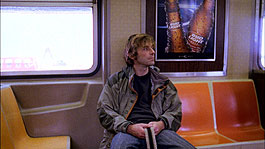
Film At the opening of the incredibly fascinating Oscar-nominated documentary film Unknown White Male, an Englishman walks into a police station near Coney Island and tells a startled police officer that he doesn't have any recollection of where he is, or more importantly who he is. The only clue to his background is the name and telephone number of someone scrawled on a pink slip of paper folded into a Latin American phrase book. As the narrative unfolds we discover that the man's name is Doug and that he has suffered from a condition called the fugue state, a type of memory loss, that leaves the patient without the ability to remember anything before the moment that they realize that they actually have amnesia. A true life Eternal Sunshine of the Spotless Mind, the film traces the story of Doug through his faltering first steps being reacquainted with his family and friends and rediscovering the world around him. Perhaps fearing that, what he would later describe as the 'accident' would happen again, Doug kept a video diary of these early few weeks and it's quite unnerving to realise that this perfectly normal, functioning human being knows less about the world than you do.
It's interesting that he seems more inclined to describe the visual - on meeting his father he talks about the yellow t-shirt which the old man wore for the first few days they were together again. Only later, when this footage recedes in favour of the material shot by his friend and director Rupert Murray does he talk frankly about how, what to him is a totally new world, makes him feel. Cleverly, the fragmentary editing of this opening section which intermixes the video diary point of view shots of hospitals and streets and Doug's own photography of details, help to create the impression of what it must have been like for the man in these early stages, not really being able to consciously link anything together. Slowly these give way to a much more conventional style as the film becomes as much about Murray's reaction and attempts to understand his old now new friend all over again.
This makes the film feel pleasingly authored - since the person making the editorial decisions is connected to the subject it makes the film seem more personal and therefore empathic than those films created by journeyman documentarians in whose detachment can make the work clinical and reasoned. It also stops the film from having the 'freakshow' element that many of these documentaries can include. Which isn't to say the film doesn't question the scientific and philosophical underpinnings of the condition and its causes. In meticulous detail a doctor presents quite a dense explanation for how the human memory works and these interviews don't dumb-down the science in a sensationalist way. Like a detective story, they offer evidence of Doug's circumstances and simply add to the mystery of how the 'accident' occurred. One of the tensions that Doug must face is that at some point his memory will return and neither he or anyone else is sure whether the old version of him, with that personality will somehow return as well or if they'll be integrated into the new him.
The most compelling aspect of the film are the interviews with friends and family as they note the changes which have occurred in Doug and his reactions to them. The impression I came away with is of a man who has been given a second chance, who has gone from being quite a blokey character to someone who is more soulful and in-tune with his feelings (an impression underpinned by the inclusion of old home movie footage that show fragments of who he was before). I thought it was interesting that all of the friends featured from his home in New York were women, but back home in London his old friends were blokes (who ultimately seem quite frustrated that he doesn't remember any of the sports he cherished before). It fundamentally questions the nature of friendship since everyone from his 'former life' somehow has to justify their connection to him - it must be hard to care about someone when they don't remember why they should be caring back.
My favourite moment is in one of the montage sequences which charted how he re-experiences the world. Doug's out in the snow for the first time and his scooped some up in his bare hand (it's New York snow so it's light and fluffy). He works the stuff into a ball and then as it crumbles though his fingers, he works whatever's left tighter and tighter until it's turned to ice. "Oh I get it!" He exclaims without a hint of that adult cynicism we all develop because we want everyone to think we know everything.
After a screening at the Sundance Film Festival, the film was accused of being a hoax, or at least that Doug is faking his condition. Watching the film I'm fairly well convinced that neither is the case. Doug would need to be acting a part as would everyone else being interviewed in the film. Even hoaxes tend to have moments which feel constructed whether it be someone trying to over convince the viewer or situations which feel set up or seem just a bit too insincere. I didn't see any of that at all. What I saw was a newly confused man trying to make his way in the world.
Really it's an excellent thing that will be a great night out when it goes on limited release from the 7th April, with screenings at FACT Liverpool 25 & 27 April.

No comments:
Post a Comment